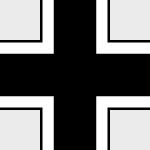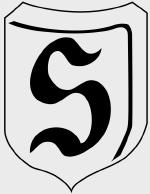Hobby Master HA7405 German Focke-Wulf Fw 190A-8 Fighter - Josef "Pips" Priller, Jagdgeschwader 26 'Schlageter', Normandy, 1944 (1:48 Scale)
"Guns before butter. Guns will make us powerful; butter will only make us fat."
- Reichsmarschall Hermann Goering, Head of the German Luftwaffe
 Nicknamed the "Butcher Bird," the Fw 190 was Germany's best air-to-ground fighter. Faster and more agile than the British Spitfire, it dominated the skies over Europe as a fighter and was the Luftwaffe's most important ground-attack aircraft. Controlled by the skilled hands of aces like Oberleutnant Otto Kittel, the FW-190 gained the reputation of being one of the greatest fighters of all time. This fighter-bomber and anti-tank aircraft was almost impossible to defeat until the introduction of the long-range P-51 Mustang.
Nicknamed the "Butcher Bird," the Fw 190 was Germany's best air-to-ground fighter. Faster and more agile than the British Spitfire, it dominated the skies over Europe as a fighter and was the Luftwaffe's most important ground-attack aircraft. Controlled by the skilled hands of aces like Oberleutnant Otto Kittel, the FW-190 gained the reputation of being one of the greatest fighters of all time. This fighter-bomber and anti-tank aircraft was almost impossible to defeat until the introduction of the long-range P-51 Mustang.
The Fw 190A-8 entered production in February 1944, it was either powered by the standard BMW 801 D-2 or the 801Q (also known as 801TU). The 801Q/TU was a standard 801D with improved, thicker armour on the front annular cowling, which also incorporated the oil tank, upgraded from 6 mm (.24 in) on earlier models to 10 mm (.39 in). Changes introduced with the Fw 190 A-8 also included the C3-injection Erhahte Notleistung emergency boost system to the fighter variant of the Fw 190 A (a similar system with less power had been fitted to some earlier Jabo variants of the 190 A) raising power to 1,980 PS (1,953 hp, 1,456 kW) for a short time. The Erhahte Notleistung system operated by spraying additional fuel into the fuel/air mix, cooling it and allowing higher boost pressures to be run, but at the cost of much higher fuel consumption. From the A-8 on Fw 190s could be fitted with a new paddle-bladed wooden propeller, easily identified by its wide blades with curved tips.
A new bubble canopy design, with greatly improved vision sideways and forward had been developed for the F-2 ground attack model, but was often seen fitted at random on A-8s, F-8s and G-8s. The new canopy included a larger piece of head armour which was supported by reinforced bracing and a large fairing. A new internal fuel tank with a capacity of 115 L (30 US gal) was fitted behind the cockpit, which meant that the radio equipment had to be moved forward to just behind the pilot. Externally, a large round hatch was incorporated into the lower fuselage to enable the new tank to be installed and the pilot's oxygen bottles were moved aft and positioned around this hatch. A fuel filler was added to the port side, below the rear canopy and a rectangular radio access hatch was added to starboard.
Other changes included an ETC 501 under-fuselage rack which was mounted on a lengthened carrier and moved 200 mm (8 in) further forward to help restore the centre of gravity of the aircraft. This fuselage would form the basis for all later variants of the Fw 190 and the Ta 152 series. The Morane "whip" aerial for Y-Verfahren was fitted as standard under the port wing, just aft of the wheel-well. Nearly a dozen Rastsatze kits were made available for the A-8, including the famous A-8/R2 and A-8/R8 Sturmbockmodels. The A-8/R2 replaced the outer wing 20 mm cannon with a 30 mm (1.18 in) MK 108 cannon, the A-8/R8 was similar but fitted with heavy armour including 30 mm (1.18 in) canopy and windscreen armour and 5 mm ( in) cockpit armour. The A-8 was the most numerous of the Fw 190 A's, with over 6,550 A-8 airframes produced from March 1944 to May 1945. A-8's were produced by at least eight factories during its lifetime.
This particular 1:48 scale replica of a Focke-Wulf Fw 190A-8 fighter was flown by Josef "Pips" Priller, who was attached to JG 26, then deployed to Normandy during 1944.
Sold Out!
Dimensions
Wingspan: 8-1/2-inches
Length: 7-1/4-inches
Release Date: October 2010
 Historical Account: "Dynamic Duo" - Josef "Pips" Priller (July 27th, 1915 - May 20th, 1961) was a German World War II fighter ace. He has become famous because of the publicity regarding his Fw 190A-8's single strafing pass attack on Sword Beach on June 6th, 1944 (D-Day), accompanied by his wingman Heinz Wodarczyk. This act was first brought to the world's attention by the book, and then the film, The Longest Day. Contrary to popular belief, Priller and his wingman were not the only Luftwaffe forces to attack the beachhead on June 6th, 1944. A Luftwaffe bomber unit Kampfgeschwader 54 made several attacks on the British beachheads on D-Day.
Historical Account: "Dynamic Duo" - Josef "Pips" Priller (July 27th, 1915 - May 20th, 1961) was a German World War II fighter ace. He has become famous because of the publicity regarding his Fw 190A-8's single strafing pass attack on Sword Beach on June 6th, 1944 (D-Day), accompanied by his wingman Heinz Wodarczyk. This act was first brought to the world's attention by the book, and then the film, The Longest Day. Contrary to popular belief, Priller and his wingman were not the only Luftwaffe forces to attack the beachhead on June 6th, 1944. A Luftwaffe bomber unit Kampfgeschwader 54 made several attacks on the British beachheads on D-Day.


